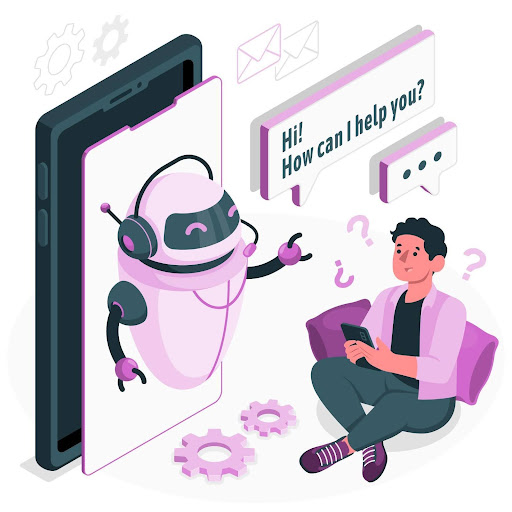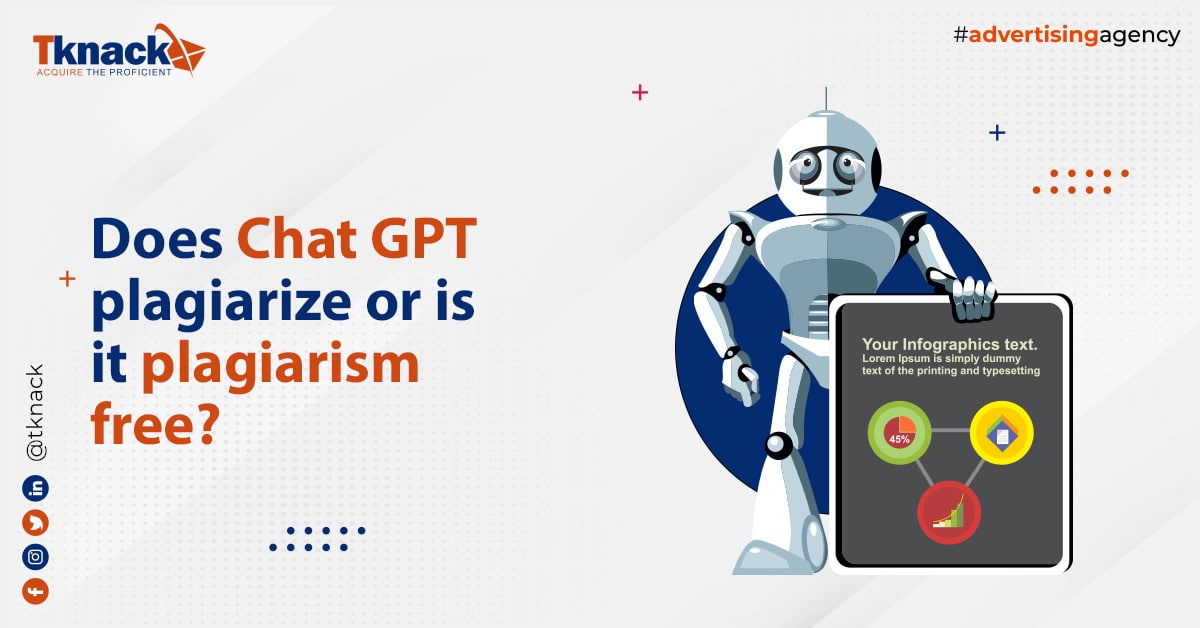Does Chat GPT plagiarize
The popularity of Chat GPT in the digital realm has steadily increased since its creation. People who are excited about the invention of Chat GPT now seem more curious to know does Chat GPT plagiarize. The digital world is constantly evolving, and ChatGPT and other AI writing tools are revolutionizing content creation. Immediately following its launch, many individuals began to recognize its potential, but as they incorporated it into their work, there was a concern about plagiarism. Does ChatGPT plagiarize, or Chat GPT is plagiarism free?
This article will focus on the constitution of chats and their connection to plagiarism. Also, share helpful advice to prevent unwitting plagiarism while working with this tool.

What is chat GPT?
ChatGPT is a language model developed by OpenAI based explicitly on the GPT (Generative Pre-trained Transformer) architecture.GPT models are built for understanding and producing text that resembles human speech based on the input they receive. ChatGPT is a GPT model that has been clarified to create conversational responses.
According to developers at OpenAI, ChatGPT is entirely plagiarism free, but it has its limitations and faults. ChatGPT is an AI tool that is capable of engaging in natural conversation. It can analyze texts and produce responses that are original and humanlike.
Despite the excitement and admiration for this pioneering technology, a question still arises: Does ChatGPT plagiarize?

WHAT GPT MEANS?
The “GPT” in ChatGPT stands for “Generative Pre-trained Transformer,” It emphasizes its transformer architecture and pre-training on a large corpus of text data before being customized for particular tasks. As of my last knowledge update in January 2022, OpenAI has released several versions of the GPT model, with GPT-3 being the latest at that time. There might be newer versions or developments in fixing the primary concern that Does ChatGPT plagiarize.
HOW CHAT GPT WORKS
ChatGPT, like other variants of the GPT (Generative Pre-trained Transformer) models, works based on a transformer architecture. Here’s a simplified explanation of how it works:
1. Data Collection:
The training of ChatGPT models, such as AI models like GPT-3, is done using vast datasets of text from the internet. This data provides them with the opportunity to learn grammar, context, and facts.
2. Pre-training:
The model’s initial training process involves analyzing an extensive database of diverse text data from the internet. Pre-training consists of teaching the model how to predict the next word in a sentence by examining past words. In fact, the model is able to capture grammar thanks to the large-scale pre-training
3. Fine-tuning:
After pre-training, the model is fine-tuned on specific datasets to make it more suitable for particular tasks. In the case of ChatGPT, it is developing to respond conversationally. Fine-tuning involves training the model on a narrower dataset with examples of the desired behavior. It helps the model adapt to the specific requirements of generating relevant context responses in conversations
4. Context-aware generation:
The transformer architecture in GPT allows the model to be context-aware. It can consider not just the current input but also the preceding context, which is crucial for generating meaningful and contextually appropriate responses in a conversation. The model can evaluate the significance of various parts of the input sequence by processing each token (word or subword) in parallel.
5. Contextual Understanding:
ChatGPT attempts to understand and maintain context during a conversation. It can refer to previous parts of the discussion and generate contextually relevant responses
It’s important to use AI responsibly and critically evaluate the information provided by these models. Additionally, they have limitations, and their knowledge is based on data available up to their training cut-off date.
CHAT GPT AND PLAGARISM
The primary concern about Chat GPT is whether Does ChatGPT plagiarize. However, ChatGPT content may not be detected by traditional plagiarism detectors, which may surprise you. Usually, when people talk about plagiarism, they’re referring to copying someone’s work word for word. Chat GPT is not capable of doing that. The wording of ChatGPT-generated content is generally unique, so it’s impossible to find it anywhere else.
WHAT IS PLAGIARISM?
Plagiarism, a demeaning act that involves using someone else’s work, ideas, or words without proper credit, is widely recognized as unethical. In the educational context, it constitutes a serious offense, often resulting in severe consequences.
Universities have taken stringent measures, including the expulsion of students, to address instances of plagiarism. Similarly, professionals have faced termination for falsely claiming authorship of others’ work.
Now, considering the role of AI in the plagiarism discourse, it becomes essential to explore how AI’s such as ChatGPT operate. An important question arises: Does ChatGPT plagiarize? To understand this, one must examine the inner workings of ChatGPT.

Techniques for Detecting Plagiarism in Chat GPT Content:
There are several methods and plagiarism checkers available to detect plagiarism in traditional texts, including Turnitin and Grammarly. Using text patterns, comparing them with established sources, and providing similarity scores, these tools excel at recognizing copied content and assessing its originality.

In the absence of comprehensive plagiarism detection, these entities may explore alternative strategies, such as:
- Educating users: Promoting awareness and educating users about the AI-generated nature of the content can help mitigate unintentional misuse.
- Guidelines for ethical use: Developing clear guidelines and policies for the utilization of AI-generated content, emphasizing responsible and ethical behavior
- Human Review: Incorporating human review alongside automated tools to assess the context and intent of the content, acknowledging the unique challenges posed by AI-generated text.
- Adaptation of Tools: Working with developers to enhance current plagiarism detection tools or create new ones that are designed explicitly for AI-generated content.
- Continuous Monitoring: Implementing ongoing monitoring and updates to stay abreast of advancements in AI and plagiarism detection technologies.
Fully addressing the challenges posed by plagiarism detection in AI-generated text, such as that produced by ChatGPT, makes continuous advancements necessary.
IS CHATGPT PLAGARISM FREE?
After gaining popularity all over the world, CHAT GPT is facing some questions from some users. Is Chat GPT plagiarism-free, or is it plagiarism to use ChatGPT?
It’s a common misconception that Chat GPT-generated content is always free of plagiarism. Thus, content that can pass plagiarism tests is well-developed. But the main question is, does ChatGPT plagiarize?
Nonetheless, copying content from external sources may happen in ChatGPT responses. It is the user’s responsibility to use the tool appropriately. Not just copy and paste the content provided by ChatGPT.
Does ChatGPT plagiarize?
Technically, Chat GPTplagiarism-free, but you should still maintain specific standards when using a tool like this, even though plagiarism checkers like Turnitin and Grammarly are starting to fight against AI-generated content and raising questions like Does ChatGPT plagiarize. There is still concern that tools like ChatGPT could cause a moral dilemma.
Despite being a fantastic research tool, ChatGPT should be used for tasks that require accuracy or originality for work paid for on its own.
Is it plagiarism to use chat GPT?
Is it plagiarism to use Chat GPT? No, it’s not; using ChatGPT itself is not plagiarism. It is a tool developed by OpenAI for generating humanlike text based on the input it receives. Certainly! It’s crucial to understand that ChatGPT or similar language models create responses based on patterns learned from a vast amount of text data during training. They lack consciousness, intent, or awareness of the concept of plagiarism, which raises the question that Does ChatGPT plagiarize?
Creating content for academic assignments, research papers, and articles is made easier with Chat GPT. In any other context where originality and proper attribution are important, it’s essential to:
- Attribute the Source: Make sure to indicate that the content was created using an AI language model like ChatGPT. Transparency and honesty depend on it.
- Follow Guidelines: If you’re using the generated content alongside other sources, make sure to cite those sources properly. Consider how the generated content fits into the overall context of your work. As you cannot solely rely on it because of the significant concern that Does ChatGPT plagiarize.
- Understand Institutional Policies: Different educational institutions and professional settings may have specific guidelines on the use of AI-generated content. Please familiarize yourself with these policies and adhere to them.
- Review and Edit: The content produced by ChatGPT must undergo review and editing as needed because of the primary concern, which is Does ChatGPT plagiarize. You have the responsibility to ensure that the final output aligns with your purpose, is accurate, and meets ethical standards.

Is chat GPT plagiarism?
The use of AI-powered chatbots, such as GPT, for writing assignments has generated a lot of controversy that does ChatGPT plagiarize. Some argue using such tools is a form of plagiarism, while others believe that it is a legitimate way to enhance writing skills. The question of whether chat GPT is plagiarism-free or is chat GPT plagiarism depends on its usage. If students rely solely on the chatbot to generate content without any input or editing of their own, then it could be considered plagiarism. However, if students use the chatbot as a tool to create ideas, keeping in mind the widely known question raised does ChatGPT plagiarize and then write their original content based on those ideas, then it can be plagiarism-free. It is essential for students to understand the ethical implications of using chat GPT, and to use it responsibly to avoid any potential consequences.
Does chat GPT repeat the answers
Chat GPT is an AI model that focuses on generating responses based on input. Although it may give similar replies at times, it has no intention to repeat the same answer which may become a cause to called is chat GPT plagiarism. The output it creates is subject to multiple influences, such as the input it receives, the conversation’s context, and the training data it has.
However, Chat GPT also uses machine learning algorithms to generate responses so that it may provide different answers to the same question based on various factors such as context, tone, and language used in the input.
Chat GPT’s purpose is to create text from the patterns and information it has gathered from a large dataset, which means it may only sometimes provide unique answers to every question.
Advantages and Disadvantages Chat GPT
ChatGPT’s popularity and ability to generate humanlike responses to questions have made it a trusted companion for many learners and educators. Just like any other new technology, ChatGPT faces some difficulties in higher education.
Using ChatGPT and similar language models comes with both advantages and disadvantages. Here are some of the key points to consider:
Advantages
Disadvantages
- Content Generation: ChatGPT can generate humanlike text, making it useful for various applications, including content creation, writing assistance, and brainstorming.
- Conversational Interaction: It excels in engaging and coherent conversation, making it valuable for chatbot development and virtual assistant applications.
- Quick Information Retrieval: ChatGPT can provide immediate information on a wide range of topics, potentially saving time in research tasks.
- Creative Writing Support: It can assist with creative writing tasks, generate ideas, and offer suggestions for various writing projects.
- Learning and Education: ChatGPT can be a valuable educational tool for learning about language structure, grammar, and various topics.
- Lack of Context Understanding: While it can generate coherent responses, ChatGPT may need a deeper understanding of context, leading to inaccuracies or nonsensical answers.
- Potential for Biases: The model may unintentionally reproduce or amplify biases present in its training data, leading to biased or inappropriate responses. ChatGPT is not responsible for verifying the accuracy of the information. The creation of content may necessitate factual corrections or updates.
- Inappropriate Content: Without proper filtering, there’s a risk of generating content that may be inappropriate, offensive, or against ethical guidelines.
- Over-reliance on Prompts: The quality of output can be significantly impacted by the input prompt, and users may need to iterate to achieve their desired results.
- Resource-Intensive: Implementing and maintaining large language models like ChatGPT may require significant computational resources.
- Concerns About Misuse: There are concerns about potential misuse of AI-generated content. Such as generating fake news, misinformation, or malicious content.
Conclusion
To conclude, our main question is: does ChatGPT plagiarize? It is essential to acknowledge that ChatGPT, as a tool, does not inherently engage in plagiarism. OpenAI’s design dictates that it generates text using learned patterns from its training data. However, users who use ChatGPT-generated content are responsible for keeping this point in mind that Does ChatGPT plagiarize to prevent plagiarism.
Read More: The Power of Amazon FBA Box Labels
Need Help?
We can help you with you brands Digital Marketing Contact us for more info and Services




